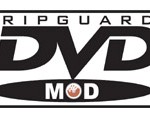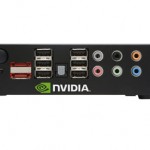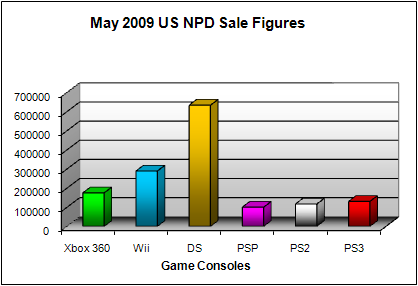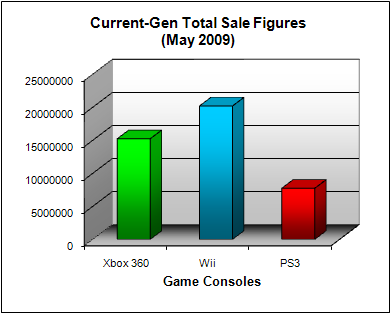Time for another Weekly News Roundup, because, funnily enough, it’s been another week since the last one. Since then, the NPD US video games sales figures for May 2009 came out, and as usual, I have posted my analysis. More bad news for the video gaming industry basically, but a slight improvement since April. And there’s yet another hyped up PS3 exclusive (inFAMOUS) that has failed to really grab a huge chunk of sales, adding to the list including LittleBigPlanet and Killzone 2, to name a few. Sure, they do sell in good numbers eventually, but so do a lot of other quite mediocre titles, including ones that aren’t even exclusive and so by common sense should be selling less on one particular console than exclusives. I do wonder how many people are like me and don’t use their PS3 for games, only for Blu-ray or media playback. I’m sure the percentage of this type of users is much higher than on the Xbox 360, while a competent media hub, is no patch on the PS3 (no Blu-ray, noisy …). Anyway, onto the news.

In copyright news, a couple of developments this week, mostly in Europe. That’s understandable, due to the attention the Pirate Bay trial has attracted, and what appears to be several European government’s obsession in pleasing their American overlords to pass strong anti-piracy legislation.

The Swedish Pirate Party now has a seat in the EU parliament
First up is good news, which is rare for this section of the WNR. The Pirate Bay may have lost a trial, but it has gained status as a political party by winning a seat in the European parliament. They won 7.1% of the vote in Sweden, which may not sound quite as impressive to people living in countries with two major parties, but considering that the largest party in Sweden got 24.6%, and that their Prime Minister’s own party only got 18.8%, the Pirate Party’s 7.1% suddenly looks a lot more significant. The traditional third party in many countries is the Green party, and they only got 3.6% more. The Pirate Party is a single issue protest party, and it’s really unheard of for such a party to receive so many votes. But that’s not to say that the one issue they represent is not an important one, or one worth fighting. Far from it. One can only hope The Pirate Party extends their reach to around the world and they can become a political force that will force some positive change for the lobbyist controlled copyright issue.
Meanwhile, the New York Times posted what appeared to be very bad news for The Pirate Bay in terms of their trial, which the headline that states that their appeal has been denied. This was sourced from an article by the Hollywood Reporter. However, both are wrong in this case, according to our forum’s resident Swedish expert, Cynthia (and a couple of other news sources). The Pirate Bay defence had claimed that the judge ruling the case was biased. The court which will see to the appeal has asked for opinions from the original court that ruled the case in regards to this claim, and the original court has denied any evidence of bias and has submitted this. This is where the confusion comes from, perhaps, because no judgement on the appeal has been made yet, and I doubt this is the only avenue of appeal anyway. Thanks again Cynthia for the update, and no thanks to the NY Times for their lack of research on the issue (even if they don’t consider it “important”).
A couple of weeks ago I posted a news item about France passing a new controversial law, dubbed the “three-strikes” law, which aims to cut off Internet usage for people found to be “guilty” of downloading pirated material three times. Of course, there is no court, no appeal of decisions, and the copyright groups can basically silence anyone it wants to without any hint of a fair process. It is no surprise then the country’s constitutional council has declared this law to be, well, un-constitutional because a system where one is assumed to be guilty and the charged needs to prove their innocence is not one that should belong in a Democratic society. The council basically says that the court has to be involved somehow, so people can prove their innocence. The French government are undeterred and plan to go ahead with the now modified law, which will now require “special judges” to rule on each and every case. But the whole point of the three strikes system is so that it doesn’t go through the criminal justice system to save time and money, but the newly modified law won’t achieve this point and one can see the court system being overwhelmed instantly. Maybe then, it will convince the French government to drop it completely.
All this emphasis on downloads seem to suggest that downloading pirated material has led to a collapse in revenue for industries such as the music industry. While the music industry has suffered from lost of revenue, there is no doubt of this (well, maybe a little), perhaps the reason is not piracy at all. The Guardian, spending a little more time doing research than the NY Times, has came up with a very interesting graph in regards to people’s spending habits. And yes, it does show music spending way down compared to just a few years ago. But the overall spending seems to have increased, to almost double of what it was in 1999. And looking at the graph in more details, it’s easy to see why this is the case. DVD sales went up quickly, but has stayed pretty flat since 2003. Music down as mentioned previously, and so is DVD rental. But people’s spendings on gaming quadrupled in the same period. So instead of piracy getting people’s money, it’s actually gaming, taking money away from music and rentals, and to be lesser degree, gaming. In the intro of this week’s WNR I talked about the NPD analysis, and one of the reasons that I have been doing the analysis posts for over a year now is because gaming is huge business and it needs to be made known that, yes, it is taking money away from the other home entertainment industries. But the point is overall spending increased, and this is despite piracy on the rise, so perhaps piracy isn’t a problem at all – it’s how the music and DVD industry, the passive entertainment industry if you will, can compete with the high level of interactivity that’s offered by video games. And while games are more expensive, say 3 times the cost of a DVD movie, but they also offer at least 3 times the entertainment, sometimes hundreds of hours of interactive entertainment, compared to only 2 or 3 hours for a typical movie (and 72 minutes for a CD). Research shows that piracy actually help to promote content, and thus promote purchases, while people who pirate are not the types to have spent money on it even if there was no pirated alternative. But let’s blame it on the pirates anyway, because that’s easy than confronting the harsher reality that music and movies aren’t as fun for the whole family as video games anymore, especially now with family oriented game consoles like the Wii.

While this is probably still Copyright news, but I’ll talk about it in the HD section since the Copyright section above was getting a bit long. The big news this week is that the AACS licensing authority, the people behind copy protection on Blu-ray, has revealed the final specifications for the AACS system. There are a couple of controversial items in the announcement, which is not surprising given the whole attitude of the DRM industry.

Say goodbye to the analog video outputs on your Blu-ray player
The big first controversial item is that analog video output is set to be banned from Blu-ray players. That’s right, after 2014, no Blu-ray player will be allowed to have component, S-Video, SCART or composite video output or they face not getting the AACS license and therefore, will be unable to play all commercial Blu-ray movies. Starting in 2011, analog output will be limited to SD resolutions only, to set the analog sunset in motion. The argument that analog is useless in the world of HDMI and DisplayPort is a perfectly valid one, and that’s reason enough for manufacturers to stop including them in their players. But to place a ban on it due to copyright reasons is just stupid. If people aren’t smart enough to just download pirated movies online, then I don’t think they’re smart enough to hook up their Blu-ray players to their DVD recorders through analog output, and then somehow find a way to by-pass the Macrovision copy protection present on all analog outputs (for DVD and Blu-ray). It’s certainly not easier than downloading. And if this measure is to stop pirates from making copies, then since existing players support analog output, don’t you think that the pirates, if they needed to pirate through analog (which they don’t), would just keep a few old players lying around to bypass this measure completely. And real pirates work at the Blu-ray disc pressing plants, and have access to the masters, which is why they can bring out a pirated version even before the official release, and this doesn’t stop them. The only thing it stops is Macrovision from getting royalties from Blu-ray (which is not a bad thing, really), and it stops people using Blu-ray on older equipment. I don’t think this will really affect that many people, since I don’t think most people will even remember what analog is in 2014, but it’s the principle of the thing, and it just shows how paranoid the content owners are (possibly thanks to scary propaganda from the DRM industry).
The other big news is that Blu-ray Mandatory Copy will begin to rollout next year. What it is, and it’s already present but not in a standardised form, is that it will allow you to make limited copies of your Blu-ray movies through the Blu-ray player itself. The copies can be on Blu-ray, DVD or even for your portable players (although no Apple based players have signed up for this yet). Blu-ray movies with MC will have an extra menu option to make copies. Each Blu-ray disc with this feature will also have an unique serial number, which is used in an online authentication system to record and place limits on your copying activities (as well as to track if the copied content eventually ends up online or not). That’s pretty much what you would expect from such a system. The problem is that current Blu-ray players do not support MC, and so if you want it, you’ll have to buy yet another Blu-ray player (Blu-ray Profile 4.0?). The PS3 may be able to accommodate this through software updates, and your PC may be updated through software as well to conform to MC standards. And despite the phrase “mandatory” in Mandatory Copy, it isn’t mandatory and is purely optional for both movie studios and hardware manufacturers. And Blu-ray movies with MC enabled will cost more. So MC may be dead before it even starts, but it does add value to be able to make portable versions of movies straight from your Blu-ray player, and it might still end up cheaper than the studio’s preferred method of you purchasing the same content many times over in each different format. I’m going to call this positive progress, because at the very least, it acknowledges the need for people to make legal copies of their movies.
Wal-Mart will be offering cheap Blu-ray players for Father’s Day, at $128 each. But take the advice from our forum members and avoid the ultra cheapo players, because they lack many of the features that the slightly more expensive players have, such as Internet connectivity.
Apple’s upcoming Snow Leopard Mac OS X revision will feature GPU assisted acceleration, including H.264 acceleration, but you will need a Mac with at least the Nvidia 9400M GPU, or you’ll miss out. The $99 iPhone should also entice more people to buy it, and it’s a nice little media player even if you don’t need all the other fancier features. And for $99, you can’t really go wrong, especially if you limit Internet usage to your home WiFi network, as opposed to spending too much on data (more of an issue here in Australia and other countries with rip-off data charges). And no, still no Blu-ray on Apple systems. And speaking of data charges, Microsoft’s HD streaming services will require a 8 to 10 Mbps connection for full quality streaming (quality will drop if connection is slower). That’s out of reach of most Australians at the very least, but maybe you lucky folks in the UK, Asia or US may get to enjoy full quality HD streaming. From a technical point of view, 8 Mbps should give you excellent 720p quality video, while 10 Mbps is probably still too low to offer Blu-ray quality 1080p video (you need at least 15 Mbps to even come close). HD video streaming is still very much bottlenecked at the bandwidth level, I’m afraid.

And in gaming, Microsoft’s Natal motion gaming system continues the media promotional blitz by appearing on Late Night with Jimmy Fallon (video in link), in a live demo that was played by Fallon. It’s certainly easier to see the potential of Natal, but until I buy it and test it out in my own home, I’m going to remain skeptical.

Can Natal really work, or will it be too inaccurate to be of any use?
But Engadget and IGN has both had plays with Natal, and they’ve said some pretty impressive things about it, including the fact that it’s surprisingly accurate. The accuracy thing is the one I’m most worried about. And the live demos showed a modified version of Burnout Paradise that works with Natal, which might mean that lots of existing games can be updated to work with it. I’m really looking forward to playing Crackdown by jumping up and down in my living room like a crazy person.
For those that want to make the comparisons between the Wii, PS3 motion controller (PMC) and Natal, I think Natal is something a bit different to what the Wii and PMC offers. The PMC is a basically a super accurate Wii-mote, and add in the PS3’s HD graphics, it could offer the Wii some real competition. Natal, on the other hand, doesn’t even require a controller, which won’t please the hardcore gamers, but might entice even more of those who don’t consider themselves gamers, much like what the Wii has done. Some people just don’t like having to learn how to use a controller, or are unable to, but being able to use your body to do something is natural to all humans and much easier to learn. Plus Natal offers voice and facial recognition as well. But don’t forget that the PS3 has the PS3 has the EyeToy camera thing, which can be adapted to function in a similar way to Natal, so don’t be surprised if Sony offers body motion controls as well.
My WordPress word counter meter tells me I’ve type 2327 words already, so I’m ready to take a break now. More words coming at you next week.


![]()










